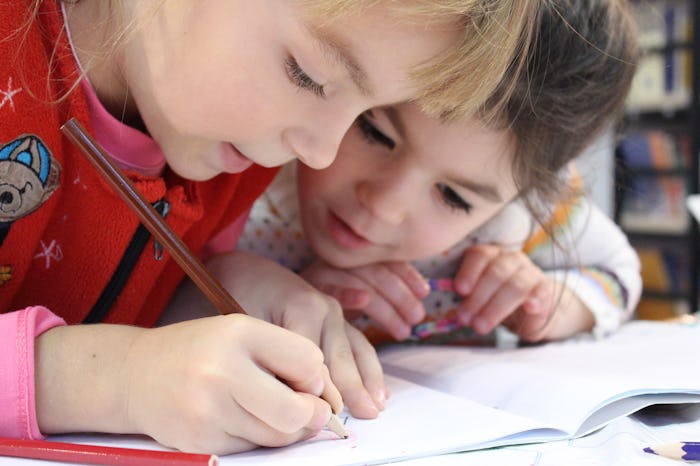You know what they say, "Its never too early to begin teaching kids about Newtonian physics." OK, so maybe that isn't a common saying — and maybe parents are more concerned about teaching their kids their ABCs than the laws of gravity. But author and scientist Dr. Chris Ferrie believes that parents can do both — and his Baby University book series, which aim to teach toddlers about physics from a young age, will help them do just that. Wondering where to buy the baby physics books so you can raise a little rocket scientist of your own? Read on.
According to NPR, the book series covers subjects like rocket science, quantum physics, and general relativity. The books teach these concepts using bright colors and simple shapes. Best of all, they are made out of thick cardboard so your teething baby can enjoy the book without actually destroying it. Yes, these might seem like big concepts to grasp, even with the help of shapes and colors, but as the editor of the book series, Kelly Barrales-Saylor, told NPR:
We know toddlers aren't going to pick up the exact high-level concepts we're explaining. We're trying to introduce the small seeds of information meant for them to remember years later.
The titles range include such topics as Rocket Science for Babies to Optical Physics for Babies and clock in around 24 pages each. You can purchase them for a little less than $10.
Rocket Science for Babies, $8, Amazon; Optical Physics for Babies, $8, Amazon
General Relativity for Babies, $6, Amazon
The good news: The series can be purchased online wherever you prefer to buy books, including on websites like Amazon or IndieBound. That way, you and your child can join the likes of Facebook founder Mark Zuckerberg, who is already a fan of the book series (he posted a photo of himself reading an early version of one of the books to daughter Max in 2015) in no time at all.
It is never too early to start teaching your children about science (or reading to them about it). Research has shown that parents who read to their children very early on have a positive effect on their child's behavior and academic performance later down the line. According to the American Academy of Pediatrics, children who are read to during infancy and preschool have better language skills by the time they start school and are more interested in reading altogether. Learning about science from a young age also has an impact on success. As Scientific American noted, studies have found that children in kindergarten are already forming negative views about science, which in turn, could affect how they view science later in life. Giving them a clear, fun understanding of the sciences early on can help them avoid that.
Because who said science had to be boring?
